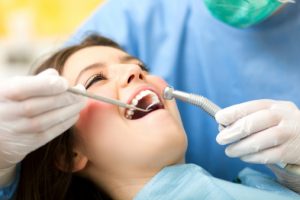 Gum disease–from mild gingivitis to dangerous periodontitis–affects almost half of adults over 30 in the United States, says the Centers for Disease Control in Atlanta. Past age 65, the number increases to about two-thirds. What can you do about gum disease? Prevention is best, but when the condition has already begun, seek skilled gum disease treatment in DC from Dr. Yelena Obholz.
Gum disease–from mild gingivitis to dangerous periodontitis–affects almost half of adults over 30 in the United States, says the Centers for Disease Control in Atlanta. Past age 65, the number increases to about two-thirds. What can you do about gum disease? Prevention is best, but when the condition has already begun, seek skilled gum disease treatment in DC from Dr. Yelena Obholz.
Symptoms of gum disease
Your Washington, DC dentist outlines several symptoms of gum disease. Some patients, however, are not even aware that they have a problem or choose to ignore obvious signs such as blood in the sink when brushing their teeth.
Signs and symptoms include:
- Redness
- Swelling (inflammation)
- Bleeding
- Pus at the gum line
- Persistent bad breath, or halitosis
- A long-toothed appearance
- Gum recession
- Exposure of tooth roots
- Deep spaces between teeth and gums (periodontal pockets)
- Bleeding
- Tenderness
- Tooth mobility and noticeable gaps between teeth
- Tooth loss
The longer gum disease is allow to fester without DC treatment, the more devastating the consequences are. In addition, researchers observe a link between systemic disease and periodontitis. Overall health problems can include:
- Cardiovascular disease
- Hypertension
- Heart attack
- Stroke
- Metabolic syndrome
- Type-2 diabetes
- Dementia
- Alzheimer’s disease
- Pregnancy complications
Dr. Obholz has done extensive work in periodontics and believes oral health definitely impacts systemic well-being.
Treating gum disease
At Aesthetic & Family Dentistry of Washington, Dr. Obholz diagnoses gum disease by simple observation and measuring periodontal pockets. Pockets deeper than 3 mm are diagnostic for gum disease.
Many cases of gingivitis and even periodontitis are treated by simple manual tooth scaling to remove plaque and tartar and root planing to smooth root surfaces so gums re-attach. Others require instillation of antibiotics to quell infection. The most difficult cases require referral to a dentist who specializes in advanced gum disease.
Prevention is key
While your Washington, DC dentist successfully treats gingivitis and periodontitis, the best treatment is prevention. To keep gums strong, pink and healthy, Dr. Obholz and her staff recommend:
- Daily flossing and twice a day brushing to remove harmful plaque
- Drinking 8 glasses of water a day to improve hydration and wash teeth and gums
- Eating a nutritious diet with several servings of fruits and vegetables daily
- Coming to Aesthetic & Family Dentistry of Washington every 6 months for oral exams and hygienic cleanings
Patients who struggle with gum disease (older adults, pregnant women, diabetics or people who are immunosuppressed) should see Dr. Obholz more frequently. The American Academy of Periodontology advises all dental patients get a CPE, or comprehensive periodontal examination, each year.
Get your check-up and cleaning
There’s no time like the present to begin better gum health. Contact your Washington, DC dentist at Aesthetic & Family Dentistry of Washington today for an appointment.
